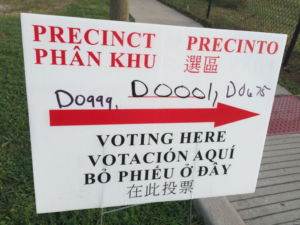
As the U.S. moves steadily towards the next election, interpreters are helping to make voting easier for people who speak languages other than English. Although the Voting Rights Act was passed decades ago, in 1965, states have been slow to put systems in place for fulfilling its goal of giving everyone the ability to vote. Recently, that has begun to change. Interpreters are being called on to help with a variety of tasks related to multilingual voting.
Why Translated Ballots Don’t Solve Everything
Translated ballots are a good first step to helping people vote. On the other hand, have you ever really observed what happens at a busy polling place on election day? If you’ve ever worked an election, you already know that people have questions. They have questions about their ballot, how to mark it, and how to submit it.
Primaries can be even more difficult, as many people from other cultures don’t understand the concept. They may feel they’re being cheated if they aren’t allowed to vote for candidates on both Republican and Democratic ballots. So, it’s not only what’s written on the ballot, but the whole voting process that many people have a hard time understanding.
Interpreting During Campaigns
Voting is meaningless if you don’t know the candidates and their positions. Fortunately, candidates are using interpreters more often now and giving them more prominent roles in their campaigns. Sign language interpreters have been used in rallies for candidates as disparate as Bernie Sanders and Donald Trump.
There are some challenges for interpreters working for political campaigns. For example, campaigns have certain set phrases and jargon that may not be easily translated to another language. Accuracy is always important in interpretation, of course. In the political arena, it can make a huge difference in how the audience perceives the candidate and ultimately can influence who wins the election.
Voter Registration
Voter registration is required, but some states don’t provide interpreters to assist with this important task. Going to sign up for the vote can be intimidating to someone who doesn’t speak English. They may not know what is required of them. They may have difficulty relaying the personal information that’s required on the form. Most of all, they may feel much more comfortable with the process if they have someone guide them through it. Interpreters aren’t usually on staff where registration is taking place. However, they can be called on if they’re needed.
Steps in Voting
Even people who have been voting in the U.S. for decades sometimes have trouble understanding the steps in voting. Different types of voting machines make the process confusing for those who have recently moved or just started voting. If you have a paper ballot, how do you submit it correctly to make sure your vote is counted. There may be signs saying what to do, but if the signs aren’t in a language you speak, they don’t help. With interpreters available, these people have someone to ask about these details.
Reading and Marking Ballots
Everyone who can read should be able to recognize the names of candidates. Even so, there is more on the ballot than those names. There may be instructions as well as propositions, amendments, and other issues to vote on. If there is a translated ballot, this isn’t too hard. For those who don’t receive a translated ballot, these issues can be difficult to understand. Interpreters are tasked with helping them understand the text without showing any partiality.
“Available on Request”
In some states, interpreters are made available for elections as a matter of course. In Queens, New York, for example, they are preparing for the upcoming election by hiring interpreters who will work only for that specific election.
In many other states, though, interpreters are only available on request. This means that people who need them have to know they’re available and how to make their request for help. Counties like Multnomah County in Oregon are making special efforts to get the word out about the availability of interpreters for voting. Other counties are less vocal about their ability to help non-English-speaking voters.
The problem is significant, especially in places like Florida, where there are tens of thousands of Puerto Ricans who have recently relocated after Hurricane Maria. Activists have brought a lawsuit against the State of Florida demanding language services for these new residents and other Hispanic voters based on the Voting Rights Act of 1965.
Scheduling Interpreters for Voting
Scheduling interpretation services for rallies and elections can be challenging. Only the most skilled interpreters can handle rally interpretation effectively. A large number of interpreters are needed for elections, and they may all be needed on the same day. If the voter is in a small town or rural location where few people speak different languages, the interpreter may have to travel a considerable distance to reach only one voter.
At the same time, life goes on as usual. Court and medical interpreters must continue to do their work on election day as they do on any other day. The demands on a language services provider can be enormous. Fortunately, scheduling software is available to help LSPs manage all their interpreters even on the busiest days. To learn more about interpreter scheduling software for language services providers, contact Interpreter Intelligence.
What Can Language Services Providers Do to Help?
Certainly, the most important job of the language services provider in multilingual voting is to make sure the right interpreters are sent when and where they’re requested. Still, LSPs may wish to help in other ways as well. They may want to contact their local polling places and ask if their services are needed. They can reach out to help voters understand their voting rights and know what types of language services are available to them. In the end, interpreters for multilingual voting can make an important civic contribution to their country, their state, and their local community.

I read your article carefully, it helped me a lot, I hope to see more related articles in the future. thanks for sharing.